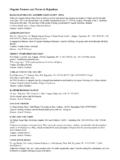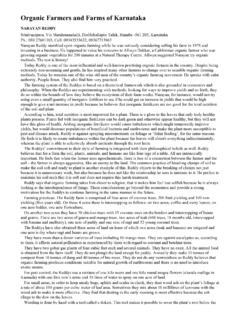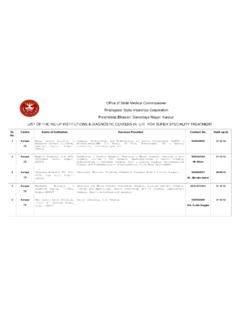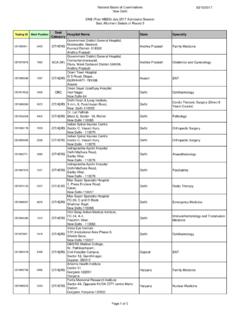Transcription of Organic Farmers and Farms in Andhra Pradesh
1 Organic Farmers and Farms in Andhra Pradesh CHALASANI DUTT. Sasikala, Prajasaktinagar, Vijayawada - 520 010, Andhra Pradesh . Phone: 0866-2473246 (R), M: 09393473246, Email: Chalasani Dutt's farm extends over 120 acres. He has been using Organic farming methods since 1995. His plantations are located at Nuzvid and Vattigudipada. He adopts a multi-crop pattern with diverse crops to attain sustainability. Vermiculture and apiculture are extensively introduced to aid productivity. On his 100-acre Nuzvid plantation, 2000 guava, 2500 coconut, 600 chickoo, 2000 mango trees of various species are intercropped. He has planted 5000 teak saplings all over the farm and also introduced drumsticks of high yielding variety. Dutt also cultivates commercial crops like rice, cashew, groundnut, ginger, turmeric, watermelon, papaya, banana, chilly and host of vegetables. A acre lake on the farm has been used to develop pisciculture. On his 20 acres Vattigudipadu plantation, Dutt has intercropped 1050 coconut palms of a wide variety with 7500.
2 Cocoa plants in the twin row' system. Compatible plants like areca nut and custard apple have been introduced in the available vacant spaces. He has also introduced commercial crops like ginger, black pepper, garlic and yam. 1000 teak saplings are planted around the perimeter. Cattle, goats and poultry are reared on the farm . They naturally adapt to the surroundings and roam free around the farm , thereby automatically manureing the trees. Cow urine is sprayed on the trees as a pest control measure. Poultry birds are effective insect destroyers, while also providing good manure. Coir-pith, which is a waste product in many coconut industries, is spread under the soil in the basins of the trees to provide valuable natural potash. Coir-pith also possesses the additional quality of having good moisture retention properties. Bio dynamic preparations, BD 500, CPP and 501 are produced in large quantities, surplus is supplied to sugarcane Farmers totaling to usage on 4000 acres.
3 Comparative experimentation has shown an additional yield of 8 to 10 metric tones per acre. Vermicompost is produced on a large scale and Dutt is able to supply this manure to other Farmers as well. Liberal dosages of farm yard manure (FYM) are mulched in the tree basins together with all the Organic matter (weeds, coconut leaves, coconut husk, coconut shells and cocoa leaves) available on the farm . Neem cake is used as additional input. Vermiwash mixed with neem oil and garlic extract is periodically sprayed to control pests. Marigold plants which abound in the farm aid in nematode control. Honeybees (apiculture) also inhabit the farm and help in cross- pollination, thus boosting yield. The pollen of these bees is another excellent inducer of useful bacteria. The fish pond abounds in plankton, which is a very nutritious food for the fish. A common practice among those practicing pisciculture is to introduce FYM into the fishpond. The FYM produces anaerobic reaction, thereby reducing the oxygen availability.
4 In contrast, vermicompost, which has a neutral pH, enhances oxygen availability. Dutt has introduced cost effective bio pesticides made from resources available on the farm . Leaves of neem, tulasi, aswhagandha, seetaphal, anrognathis, panicveta, Dhatura/thorn apple, nuxmomica, madhar (calotrpis) are first soaked in boiling water, then filtered and mixed with 150 litres of water, 10 litres of cow urine, 25 litres of vermiwash and 15. litres of biopesticide. This is used as a foliar spray. It gives good results. In 2003, he sprayed 500 litres of cow milk on mangoes with excellent results. Dutt firmly believes that Organic ' is the best way to live, for our health, for our children, for our planet and for the future. (Source: Communication with OIP.). STRAINATA. 5-58, Kasba Road, Katakeri, Kohir - 502 210, Andhra Pradesh . Phone: 08451-289904, Email: (Contact: Asha Kachhru, , B. Pandu). Strainata is a Sanskrit word meaning multiplication of female culture and female energy.
5 Strainata is a small NGO, coordinated by an urban woman and a rural family together. Our aim is to show that if privileged urbanites devote some of their time and energy to rural communities, then even without big funds from western donor agencies, the rural poor can attain some qualitative change in their lives. We promote Organic agriculture both as an alternative lifestyle for urban-ites as well as a sustainable alternative for the rural folk. For everyone, this means healthy food. We now have 15 years of experience in Organic agriculture and rural women's development, working with women from 3 villages, Ranjole, Bidaikanna and Kohir, all in Medak district, Andhra Pradesh . We have 7 acres of black soil land, 2 oxen, and a bullock-cart for our agricultural work and a simple old rural house. This old house is also our office and meeting place for the rural women. We have tried out no tilling as per Fukuoka, then tilling with tractor and bullock-cart and now we are mostly tilling with the oxen and only rarely with the tractor.
6 We have gathered experience with both rain-fed as well as irrigated land in Medak district. We produce both sustenance as well as cash crops. We have grown cereals, pulses, oilseeds, sugarcane, ginger, turmeric, potatoes, maize, bananas and guavas, besides vegetables for our daily use. We have sold Organic jaggery, pulses, sorghum (janwari), wheat, safflower oil and turmeric powder to Green shops and progressive groups in Delhi (Navdanya), Bombay (Kavita Mukhi and Vijaya Venkat), Bangalore (Econet and Vanaja Ramprasad), Madurai (Asha hospital and Ritamma David) etc. Our major earnings come from the sale of Organic jaggery and safflower oil. Due to drought related and ecological problems as well as problems with some pests like aphids and caterpillars, we are not able to sell these items lately. We use only Organic manure and have mostly avoided pesticides and chemical fertilizers. However despite the use of neem oil, detergent powder, chili powder and some fungi cultures obtained from ICRISAT we have not got more than approx.
7 3 bags (each a quintal) per acre. In fact neither the expertise of Krishi Vigyan Kendra (in our vicinity) nor that of ICRISAT has been of much use to us. It is the expertise of the local indigenous peoples and small Farmers that has helped us proceed further. But even these Farmers need training in modern techniques, which is not easily available. Due to high costs of Organic manure and increasing labour costs, we cannot say that we have a positive cost-benefit ratio. But it is a great joy to be able to eat self-produced, healthy food. Besides we are contributing to empowerment of rural poor, particularly the women and children. One of our strengths has been the emphasis on the social dimensions of Organic agriculture. We now have around 150 women organised in self-help groups and they are able to handle on their own, loans from various sources like the IRDP/DRDA and cooperative societies of the Indian government. We have also arranged for animals and land for some of these women to make them self-reliant.
8 We see the non-existence of agricultural extension services and non-availability of subsidies as the major obstacles to Organic farming. Also, the low prices for the better and healthier Organic produce are de-motivating factors for many potential Organic Farmers in our area. After 15 years of our own experience with Organic agriculture, we are now in a better position to represent rural women and men's issues in various fora at regional, national and international level. We are part of various networks of Organic movements including OFAI, IFOAM and World Social Forum (WSF). Since we believe that personal is political' we have not hesitated to document our personal joys and travails, besides many social and political issues concerning rural women/men and children. We periodically send out newsletters to friends and well-wishers all over the world. This has enabled us to get support and raise funds from friends, and the need for big donor agency funds, which require detailed reporting and accounting, has been avoided.
9 We feel a lot more needs to be done to promote the Organic movement in India. (Source: Communication with OIP). VIJAYA RAMA RAJU. c/o Bharatiya Kisan Sangh, 2-2-1118/3/6, Lingalagadda, New Nallakunta, Hyderabad - 500 044, Andhra Pradesh . Vijaya Rama Raju is one of the state's vice presidents of the Bharatiya Kisan Sangh. He belongs to Tetali village near Tanuku of West Godavari District. He comes from a farmer's family and has been actively involved in cultivation for the last 25 years. He shifted to natural farming six years ago. Five years ago, one acre of land was brought under natural farming. The soil was tilled with six cartloads of dung and leaves of green gram (pilli pesara in Telugu). Later on, the land was prepared for transplantation. Rice seed MTU. 7029 has been used for the last three years and has given a good yield of 32 bags. He also used MTU 1001 which resulted in an equally good yield of 32 bags. He does not use fertilisers or pesticides. He thus saved Rs 1500 per acre.
10 In bidding good bye to pesticides and the hole-in-the-pocket fertilisers, the ground was automatically ready to welcome the Farmers ' friends like earthworms, frogs and myriad birds. The earth retained its minerals and the land's power of resistance increased. Raju is pleased to now have healthy rice for consumption and healthy grass for his animals. He has saved expenditure on pesticides, fertilizers and no longer needs to ask for loans. (Source: K. Vidhyasagar Rao, Bharatiya Kisan Sangh, 1995). TIMBAKTU COLLECTIVE. Chennekothapalli Village - 515 101, Anantapur District, Andhra Pradesh . Tele: 08559-202149, 202335, 202339. Email: / Website: It all began in 1990 when a group of like minded people who had been working in the development sector for over ten years got together and bought 32 acres of degraded wasteland in the remote villages of chronically drought hit Anantapur district, in the Rayalaseema region of Andhra Pradesh . The intention was to work towards restoring the land, experiment with alternative lifestyles, explore soil and water conservation techniques as well as alternatives in energy, horticulture and agriculture.








